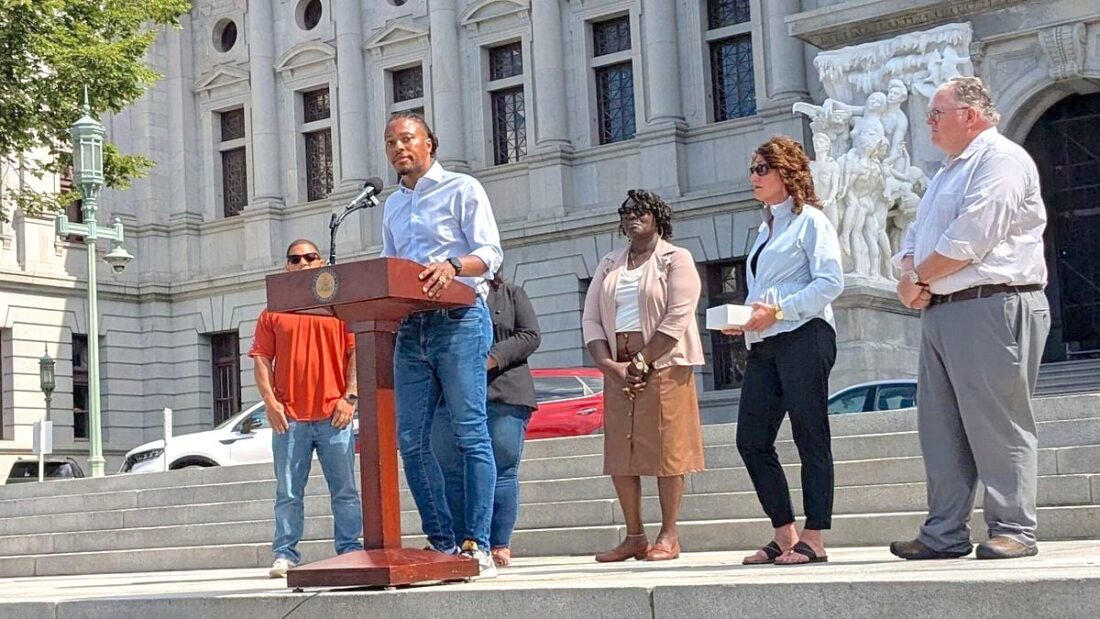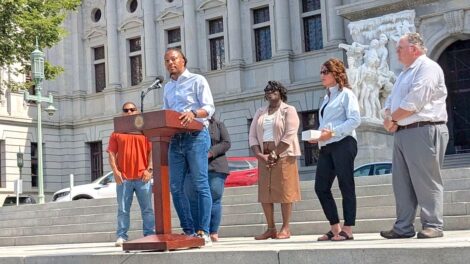Kenyatta walks from Philly to Capitol, tells senators to ‘do their jobs’

Center Square photo by Christina Lengyel Pennsylvania state Rep. Malcolm Kenyatta speaks on the steps of the Capitol in Harrisburg after walking from Philadelphia in support of mass transit funding on Tuesday.
With a bit of a limp, Rep. Malcolm Kenyatta made his way up the Capitol steps to cheers and applause. The Philadelphia Democrat had just completed a 105-mile walk to demand funding for mass transit.
The journey from Philadelphia to Harrisburg took place over four days, spanning the Democratic National Committee Vice Chair’s entire Labor Day weekend and taking him through urban, suburban, and rural communities in southeastern and central Pennsylvania.
The walk, he said, was to keep attention on transit, a major element of the ongoing budget stalemate in the commonwealth. At rallies in Philadelphia, West Chester, Lancaster, and Harrisburg, he urged Pennsylvanians to pressure Republicans in the Senate to “do their jobs” by coming to the table on a funding solution.
“When you’re stuck in traffic because there are 275,000 more cars on the road, just remember, it’s Republicans in the Senate that are keeping you from starting your dinner, that are keeping you from doing homework with your kids, that are keeping you from sitting down with your spouse and enjoying the evening,” said Kenyatta. “That is what they are robbing us of, the ability to live whole, full lives.”
The representative cited an Aug. 25 clay shooting fundraiser for Senate Majority Leader Joe Pittman, R-Indiana, as evidence that the upper chamber had dropped the ball on governing in favor of courting donors and vacationing.
Kenyatta said several Republican senators, including Langhorne’s Frank Farry, have launched Facebook ads saying that they voted to fund transit. This refers to a proposed solution that would use money from the state’s Public Transportation Trust Fund to temporarily shore up SEPTA service.
Democrats argue that this solution amounts to “defunding” SEPTA by pulling from dollars specifically allocated for capital projects like vehicle and infrastructure repair and improvement. SEPTA itself did not support the bill.
“Senate Republicans understand the importance of a strong and robust transportation network across our great state,” wrote Pittman on X in August a day after the SEPTA transit funding deadline had passed. “Pennsylvania needs common-sense solutions that take advantage of the money we have before asking hardworking taxpayers to send more of theirs to Harrisburg.”
Republicans have said that’s exactly what Gov. Josh Shapiro did when he pulled from PennDOT’s federal highway funds to sustain SEPTA with the mandate that the legislature find a permanent solution. House Democrats have passed five separate funding bills, but the Senate has taken up none.
Shapiro’s plan would dedicate 1.75% of the state’s sales tax revenue to funding transit in the commonwealth’s 67 counties. Republicans on the House Transportation Committee argued that to do so would be a gamble that assumes sales tax revenue will remain as high in the future as it is today.
Even in the state’s far-flung rural and exurban areas, transit is an essential government service, particularly for less mobile communities like the elderly and those living with disabilities. Although SEPTA and Pittsburgh Regional Transit would receive the lion’s share of new transit funding, Democrats have emphasized the whole picture to try to dispel the notion of a choice between supporting major metropolitan areas and maintaining distant roads and bridges.
“We’re talking about Westmoreland to Montgomery, Erie to Lancaster, Lackawanna to York,” said AFL-CIO president Angela Ferritto. “We have this problem everywhere if we can’t get something done.”
Republicans have accused Democrats of compromising budget negotiations with political theater, lambasting them for attacks on social media and in press conferences that they say push the two sides farther from making a deal.





